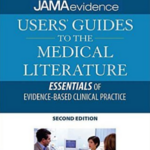
All of the evidence relevant for health decision-making, including world's largest systematic review database, curated and annotated by our network of collaborators.

Articles are connected, so you can easily move from any article to all the evidence answering the same question. You can see the forest, not only the trees!

Find what you are looking for using our multilingual foolproof search tools. Searching for the best available evidence has never been easier!

Epistemonikos is innovative both in simultaneously searching multiple resources and in indexing and interlinking relevant evidence...
...for example, Epistemonikos connects systematic reviews and their included studies, and thus allows clustering of systematic reviews based on the primary studies they have in common. Epistemonikos is also unique in offering an appreciable multilingual user interface, multilingual search, and translation of abstracts in more than 9 languages.
Users' Guides to the Medical Literature

Epistemonikos is an important new innovation in the world of accessing evidence
Epistemonikos has become one of the largest databases of health evidence, a user friendly source that includes over 100,000 systematic reviews and hundreds of thousands of individual studies. Apart from the amount of information, Epistemonikos is unique in a number of ways. First, it caters to non-English speaking users - you can conduct your search in any of 9 languages. Second, a "matrix of evidence" tool facilitates quick searching and updating. The tool identifies all systematic reviews that address a particular question, and all the studies included in those reviews, displaying a cross-tabulation of reviews and studies. It also allows you to stay up to date: after you save your search, any new review will appear automatically.
Gordon Guyatt Distinguished University Professor at McMaster University in Hamilton, Ontario. Pioneer in evidence-based medicine, coined the term "evidence-based medicine" in 1990.

Epistemonikos has quickly become an essential tool for anyone interested in using evidence to inform healthcare decisions
With over 100,000 systematic reviews plus the studies included in those reviews plus overviews of reviews, Epistemonikos is not only the world's largest database of systematic reviews, it is one of the easiest to use. In addition to making it easy to quickly find them, it makes it easy to compare systematic reviews. Epistemonikos has quickly become an essential tool for anyone interested in using evidence to inform healthcare decisions. It also is a unique platform for creating specialised databases, such as PDQ-Evidence, a database of systematic reviews that provides quick access to the best evidence for informing decisions about health systems.
Andy Oxman Research Director, Global Health Unit, Norwegian Institute of Public Health

As far as I am aware, Epistemonikos is the first, systematic, machine-assisted attempt to identify and address duplication and waste in preparing systematic reviews.
Iain Chalmers Founder of the Cochrane Collaboration 1st Cochrane Lecture, 20th Cochrane Colloquium